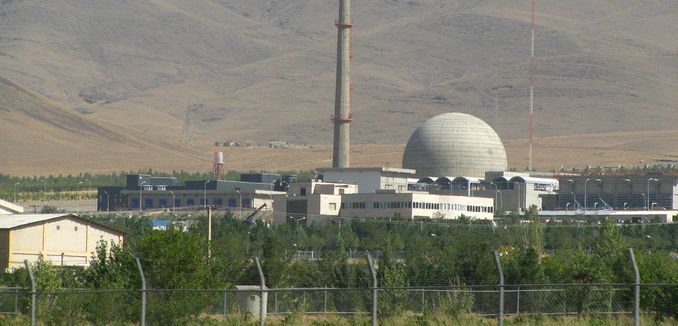The United States and its negotiating partners secretly granted Iran exemptions from some of its responsibilities under last year’s nuclear deal, which Tehran would have otherwise failed to fulfill in time to receive nuclear-related sanctions relief on Implementation Day, according to a report (.pdf) published Thursday by the Institute for Science and International Security.
David Albright, the president of the institute, and Andrea Strickler, a senior policy analyst there, cataloged three areas where the Joint Commission, comprised of the U.S. and its partners, allowed Iran to keep nuclear material and equipment in excess of what was permitted by the nuclear agreement, known as the Joint Comprehensive Plan of Action (JCPOA). Albright and Stricker cited unnamed senior officials as their sources.
The Joint Commission’s exemptions allowed Iran to bypass the cap on stockpiles of low enriched uranium (LEU), which the deal mandates must not exceed 300 kilograms; declared some of Iran’s near 20 percent LEU “unrecoverable”; and let Iran exceed limits on its operation of large hot cells, which can be used to separate the plutonium needed to fuel a nuclear bomb.
A knowledgeable senior official cited by the report said that if the Joint Commission had not granted these exemptions, some of Iran’s nuclear facilities would not have been in compliance with the JCPOA by Implementation Day in January.
The Joint Commission also allowed Iran to export its excess heavy water — nuclear runoff that can be used to produce weaponizable material — and store it in Oman, even while it had no buyer. This loophole let Iran exceed the 130 ton limit on heavy water imposed by the nuclear deal, even “as it continues to produce heavy water at its Arak facility,” the report observed. The heavy water was eventually bought by the U.S. in a highly controversial purchase.
Furthermore, the Joint Commission established a Technical Working Group to address future issues of excess LEU. The working group may well “lay the basis to exempt more LEU from the cap” set by the nuclear deal, the report added. If Iran would choose to violate the agreement, it could recover the excess LEU, enrich it, and shorten its breakout time to a nuclear weapon.
The report spelled this out in greater detail:
While Iran and its allies may today view the LEU as non-recoverable, that view does not appear to be a sufficient standard to meet the JCPOA conditions or prevent the LEU’s use in a breakout. A country intent on breaking out and making highly enriched uranium as national priorities may make an entirely different calculation about the LEU’s worth and devote considerable effort to recovering the LEU, such as during a push to acquire nuclear weapons in a crisis.
The report also criticized the secrecy surrounding the exemptions. “The intention appears to be to conduct these discussions and the associated decision making about LEU exemptions in secret, without any public scrutiny,” it noted. The Obama administration “informed Congress of key Joint Commission decisions on Implementation Day but in a confidential manner,” it added. However, in response to the report, Sen. Robert Menendez (D – N.J.) told Reuters: “I was not aware nor did I receive any briefing (on the exemptions).”
Because the JCPOA is a public document, “any rationale for keeping these exemptions secret appears unjustified,” the report pointed out. The secrecy over these decisions “risks advantaging Iran by allowing it to try to systematically weaken the JCPOA,” it continued.
When President Barack Obama announced that nuclear-related sanctions were lifted from Iran, he said that “Iran has now fulfilled key commitments under the nuclear deal,” but made no mention of the exceptions that allowed Iran to meet its obligations.
Mark Dubowitz, executive director of the Foundation for Defense of Democracies, cautioned after the nuclear deal was announced that it gave Iran a “nuclear snapback.” The way certain segments of the deal are phrased allows Iran to back out of the agreement, in part or in full, if new nuclear-related sanctions are imposed in response to Iranian violations, he explained. This means that “the only thing you’ll take to the Security Council are massive Iranian violations because you’re certainly not going to risk the Iranians walking away from the deal and engaging in nuclear escalation over smaller violations,” Dubowitz wrote.
The Obama administration has in the past rejected charges that Iran violated the commitments it made in the nuclear deal. While Iran was prohibited from testing advanced centrifuges under the interim nuclear deal, the International Atomic Energy Agency found in November 2014 that Iran broke the agreement by feeding uranium oxide into an advanced centrifuge. The White House overlooked the violation in March 2015, calling the incident an error rather than a deliberate violation.
Last June, just before the nuclear deal was reached, The New York Times reported that Iran’s stockpile of low-enriched uranium was too high. The Obama administration dismissed the Times report as “not true.” The Institute for Science and International Security criticized this response, observing that “it tends to confirm the views of critics that future violations of a long term deal will be downplayed for the sake of generating or maintaining support for the deal.”
[Photo: Nanking2012 / YouTube ]




